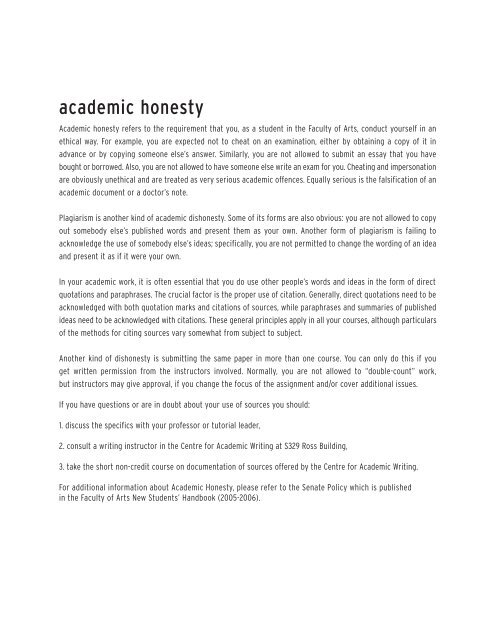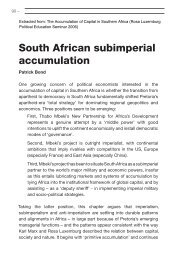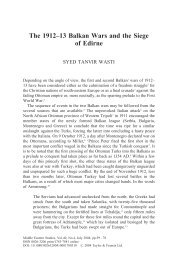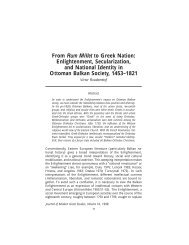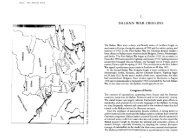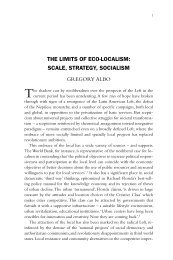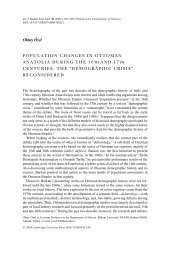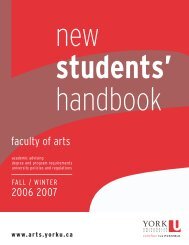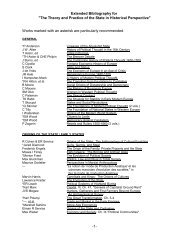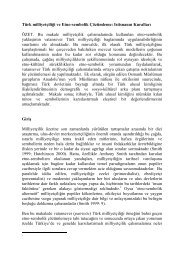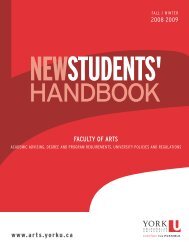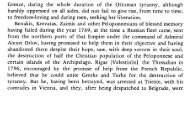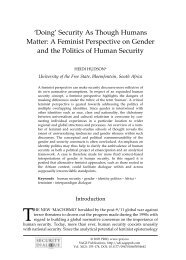FYCSG 05/06 REV2 - Faculty of Arts - York University
FYCSG 05/06 REV2 - Faculty of Arts - York University
FYCSG 05/06 REV2 - Faculty of Arts - York University
You also want an ePaper? Increase the reach of your titles
YUMPU automatically turns print PDFs into web optimized ePapers that Google loves.
academic honesty<br />
Academic honesty refers to the requirement that you, as a student in the <strong>Faculty</strong> <strong>of</strong> <strong>Arts</strong>, conduct yourself in an<br />
ethical way. For example, you are expected not to cheat on an examination, either by obtaining a copy <strong>of</strong> it in<br />
advance or by copying someone else’s answer. Similarly, you are not allowed to submit an essay that you have<br />
bought or borrowed. Also, you are not allowed to have someone else write an exam for you. Cheating and impersonation<br />
are obviously unethical and are treated as very serious academic <strong>of</strong>fences. Equally serious is the falsification <strong>of</strong> an<br />
academic document or a doctor’s note.<br />
Plagiarism is another kind <strong>of</strong> academic dishonesty. Some <strong>of</strong> its forms are also obvious: you are not allowed to copy<br />
out somebody else’s published words and present them as your own. Another form <strong>of</strong> plagiarism is failing to<br />
acknowledge the use <strong>of</strong> somebody else’s ideas; specifically, you are not permitted to change the wording <strong>of</strong> an idea<br />
and present it as if it were your own.<br />
In your academic work, it is <strong>of</strong>ten essential that you do use other people’s words and ideas in the form <strong>of</strong> direct<br />
quotations and paraphrases. The crucial factor is the proper use <strong>of</strong> citation. Generally, direct quotations need to be<br />
acknowledged with both quotation marks and citations <strong>of</strong> sources, while paraphrases and summaries <strong>of</strong> published<br />
ideas need to be acknowledged with citations. These general principles apply in all your courses, although particulars<br />
<strong>of</strong> the methods for citing sources vary somewhat from subject to subject.<br />
Another kind <strong>of</strong> dishonesty is submitting the same paper in more than one course. You can only do this if you<br />
get written permission from the instructors involved. Normally, you are not allowed to “double-count” work,<br />
but instructors may give approval, if you change the focus <strong>of</strong> the assignment and/or cover additional issues.<br />
If you have questions or are in doubt about your use <strong>of</strong> sources you should:<br />
1. discuss the specifics with your pr<strong>of</strong>essor or tutorial leader,<br />
2. consult a writing instructor in the Centre for Academic Writing at S329 Ross Building,<br />
3. take the short non-credit course on documentation <strong>of</strong> sources <strong>of</strong>fered by the Centre for Academic Writing.<br />
For additional information about Academic Honesty, please refer to the Senate Policy which is published<br />
in the <strong>Faculty</strong> <strong>of</strong> <strong>Arts</strong> New Students’ Handbook (20<strong>05</strong>-20<strong>06</strong>).


